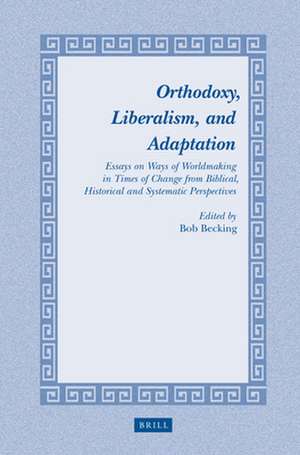Orthodoxy, Liberalism, and Adaptation: Essays on Ways of Worldmaking in Times of Change from Biblical, Historical and Systematic Perspectives: Studies in Theology and Religion, cartea 15
Editat de Bob E.J.H. Beckingen Limba Engleză Hardback – 24 aug 2011
Din seria Studies in Theology and Religion
- 15%
 Preț: 499.18 lei
Preț: 499.18 lei - 15%
 Preț: 482.50 lei
Preț: 482.50 lei - 18%
 Preț: 587.25 lei
Preț: 587.25 lei - 18%
 Preț: 646.64 lei
Preț: 646.64 lei - 18%
 Preț: 892.16 lei
Preț: 892.16 lei - 18%
 Preț: 622.87 lei
Preț: 622.87 lei - 18%
 Preț: 611.05 lei
Preț: 611.05 lei - 18%
 Preț: 687.15 lei
Preț: 687.15 lei -
 Preț: 310.62 lei
Preț: 310.62 lei - 18%
 Preț: 646.43 lei
Preț: 646.43 lei - 18%
 Preț: 777.27 lei
Preț: 777.27 lei - 18%
 Preț: 699.26 lei
Preț: 699.26 lei - 18%
 Preț: 575.43 lei
Preț: 575.43 lei - 18%
 Preț: 546.78 lei
Preț: 546.78 lei - 18%
 Preț: 638.49 lei
Preț: 638.49 lei - 18%
 Preț: 640.71 lei
Preț: 640.71 lei - 18%
 Preț: 560.98 lei
Preț: 560.98 lei - 18%
 Preț: 566.28 lei
Preț: 566.28 lei - 18%
 Preț: 753.78 lei
Preț: 753.78 lei - 15%
 Preț: 366.92 lei
Preț: 366.92 lei - 15%
 Preț: 498.27 lei
Preț: 498.27 lei - 15%
 Preț: 435.15 lei
Preț: 435.15 lei - 15%
 Preț: 481.68 lei
Preț: 481.68 lei - 15%
 Preț: 366.53 lei
Preț: 366.53 lei
Preț: 662.70 lei
Preț vechi: 808.16 lei
-18% Nou
Puncte Express: 994
Preț estimativ în valută:
126.81€ • 130.82$ • 105.82£
126.81€ • 130.82$ • 105.82£
Carte indisponibilă temporar
Doresc să fiu notificat când acest titlu va fi disponibil:
Se trimite...
Preluare comenzi: 021 569.72.76
Specificații
ISBN-13: 9789004208698
ISBN-10: 9004208690
Pagini: 304
Dimensiuni: 155 x 235 mm
Greutate: 0 kg
Editura: Brill
Colecția Brill
Seria Studies in Theology and Religion
ISBN-10: 9004208690
Pagini: 304
Dimensiuni: 155 x 235 mm
Greutate: 0 kg
Editura: Brill
Colecția Brill
Seria Studies in Theology and Religion
Cuprins
Introduction: Why This Volume
Bob Becking (Utrecht University)
Chapter One: Religious Orthodoxy as a Modality of “Adaptation”
Staf Hellemans (Tilburg University)
Part II
BIBLICAL STUDIES
Chapter Two: Does an Exclusive Veneration of God Necessarily Have to Be Violent? Israel’s Stony Way to Monotheism and Some Theological Consequences
Rainer Albertz (University of Münster)
Chapter Three: Coping with Violence in the Bible: A Response to Rainer Albertz
Jan Willem van Henten (University of Amsterdam)
Chapter Four: “Common Judaism”, “the Parting of the Ways”, and “the Johannine Community”
Adele Reinhartz (University of Toronto)
Part III
HISTORICAL STUDIES
Chapter Five: Believing, Belonging, and Adapting. The Case of Religious Modernism
Ernestine van der Wall (Leiden University)
Chapter Six: “When Creed and Morals Rot …”: Orthodoxies versus Liberalisms in the Nineteenth-Century Netherlands Reformed Church
David J. Bos (Utrecht University)
Chapter Seven: Truth, Orthodoxy, and the Nouvelle Théologie: Truth as Issue in a “Second Modernist Crisis” (1946-1950)
Jürgen Mettepenningen (Leuven University)
Part IV
SYSTEMATIC STUDIES
Chapter Eight: Orthodoxy, History and Theology: Recontextualisation and Its Descriptive and Programmatic Features
Lieven Boeve (Catholic University Leuven)
Chapter Nine: Orthopraxis and Being Faithful to One’s Tradition
Peter Jonkers (Tilburg University)
Chapter Ten: Reconstructing the Change from Judaism to Christianity as a Paradigm Shift
Dirk-Martin Grube (Utrecht University)
Chapter Eleven: Christian Fundamentalism as a Reaction to the Enlightenment Illustrated by the Case of Biblical Inerrancy
Marcel Sarot (Utrecht University)
Part V
CONCLUSIONS
Chapter Twelve: The Ambivalence of Adaptation and the Ongoing Strength of Religion
Bob Becking (Utrecht University)
Bob Becking (Utrecht University)
Chapter One: Religious Orthodoxy as a Modality of “Adaptation”
Staf Hellemans (Tilburg University)
Part II
BIBLICAL STUDIES
Chapter Two: Does an Exclusive Veneration of God Necessarily Have to Be Violent? Israel’s Stony Way to Monotheism and Some Theological Consequences
Rainer Albertz (University of Münster)
Chapter Three: Coping with Violence in the Bible: A Response to Rainer Albertz
Jan Willem van Henten (University of Amsterdam)
Chapter Four: “Common Judaism”, “the Parting of the Ways”, and “the Johannine Community”
Adele Reinhartz (University of Toronto)
Part III
HISTORICAL STUDIES
Chapter Five: Believing, Belonging, and Adapting. The Case of Religious Modernism
Ernestine van der Wall (Leiden University)
Chapter Six: “When Creed and Morals Rot …”: Orthodoxies versus Liberalisms in the Nineteenth-Century Netherlands Reformed Church
David J. Bos (Utrecht University)
Chapter Seven: Truth, Orthodoxy, and the Nouvelle Théologie: Truth as Issue in a “Second Modernist Crisis” (1946-1950)
Jürgen Mettepenningen (Leuven University)
Part IV
SYSTEMATIC STUDIES
Chapter Eight: Orthodoxy, History and Theology: Recontextualisation and Its Descriptive and Programmatic Features
Lieven Boeve (Catholic University Leuven)
Chapter Nine: Orthopraxis and Being Faithful to One’s Tradition
Peter Jonkers (Tilburg University)
Chapter Ten: Reconstructing the Change from Judaism to Christianity as a Paradigm Shift
Dirk-Martin Grube (Utrecht University)
Chapter Eleven: Christian Fundamentalism as a Reaction to the Enlightenment Illustrated by the Case of Biblical Inerrancy
Marcel Sarot (Utrecht University)
Part V
CONCLUSIONS
Chapter Twelve: The Ambivalence of Adaptation and the Ongoing Strength of Religion
Bob Becking (Utrecht University)
Notă biografică
Bob Becking, Ph.D. (1985) in Theology, Utrecht University, is Senior Research Professor for Bible, religion and Identity at the Faculty of Humanities of Utrecht University. He published extensively on the history of the religion in Ancient Israel and on questions concerning the interpretation of the Hebrw Bible. He was one of the Editors of the Dictionary of Deities and Demons in the Bible (Brill, 1999)
